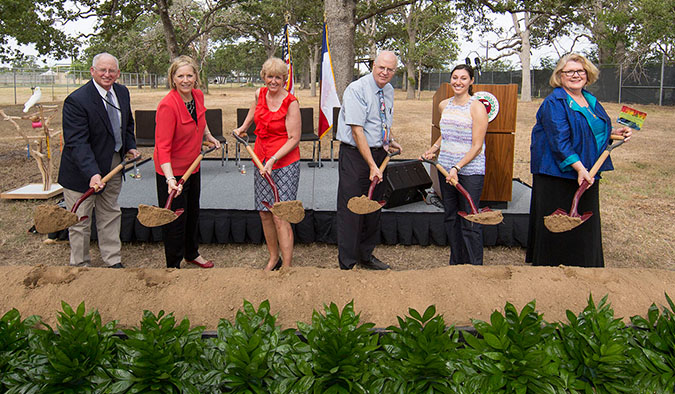Texas A&M College of Veterinary Medicine & Biomedical Sciences Breaks Ground on a New Exotic & Wild Bird Aviary
View Renderings: Rendering 1, Rendering 2, Rendering 3 | View Location
COLLEGE STATION, TX – The Texas A&M University College of Veterinary Medicine & Biomedical Sciences (CVM) officially broke ground Friday on a new Exotic & Wild Bird Aviary scheduled for completion in May 2014.
The new building will be approximately 11,000 square feet and will contain a functional hospital, receiving area with quarantine capabilities, two isolation rooms, a Biosafety Level 2 laboratory for infectious disease research, spacious teaching and classroom space, and four offices.

“Based upon its excellence, our avian programs are growing,” said Dr. Eleanor M. Green, Carl B. King Dean of Veterinary Medicine. “Our faculty have made substantial contributions to the health and welfare of birds and to the avian industry, in terms of educating future and current veterinarians, providing the highest level of avian patient care, and advancing the knowledge edge. As leaders in avian medicine, we also train the next generation of veterinarians and scientists to continue this important mission. This facility will provide the laboratory, avian housing, and classroom space that will allow this program to continue to thrive.”
“This is a beautiful facility that exemplifies the College’s commitment to exotic species and to conservation in general,” said Dr. Ian Tizard, Richard M. Schubot Professor of Exotic Bird Health and Distinguished Professor of Immunology in the Department of Veterinary Pathobiology at the CVM. “It enhances our programs in environmental health and will be a magnificent resource for the whole college.”
The new, climate-controlled aviary will be able to house a population of 200-250 birds-many more than is possible in the current facilities-in a comfortable and safe environment, with separate spaces for infected and healthy birds, which will help researchers conduct their studies. For example, one major research program into the prevention and treatment of proventricular dilatation disease involves birds infected with avian bornavirus. In the new facility, these birds can be kept separate from both healthy birds and birds infected with other diseases.
“With a newer, more modern aviary, we will be able to attract more interest in both the university and the college, leading to more collaborative efforts and more student involvement,” said Dr. Sharman M Hoppes, Clinical Associate Professor in the Department of Small Animal Clinical Sciences at the CVM and a specialist in avian medicine.
“We will have much better teaching facilities, not only for undergraduates and DVM professional students but also for continuing education and other courses,” Tizard said. The new building, with its dedicated teaching space, will better promote an understanding of avian diseases, husbandry, and conservation among current and future veterinarians. The enlarged and enhanced facilities will also provide space for specialized birds, such as raptors, for which the students can learn appropriate care and treatment.
The new facility will expand the capabilities of the Schubot Exotic Bird Health Center at the CVM, founded in 1987 by an endowment from Mr. Richard M. Schubot with matching funds provided by Texas A&M University. The center conducts research into all aspects of disease in wild and captive birds, as well as avian genetics, genomics, nutrition, and behavior. The results of research at the center are already being applied to improving the health of birds kept by zoos, aviculturists, and individual pet owners, as well conserving threatened avian species in the wild.
“Although the Schubot Exotic Bird Health Center is already known internationally in the avian world, many in our own university and community are unaware that we are here and what we have done or are doing in terms of both avian conservation and clinical diagnosis and treatment,” Hoppes said. “This new and improved aviary will increase our exposure and hopefully excite the community and encourage them to support our work in avian research and the care and management of our birds.”


